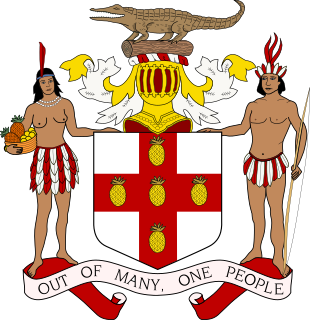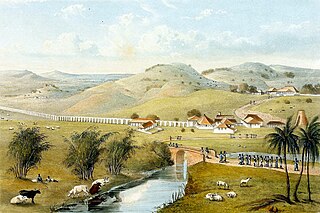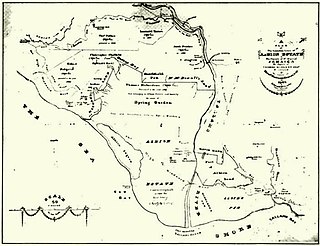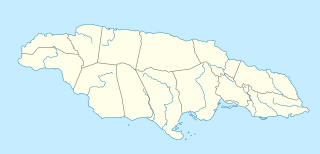
The parishes of Jamaica are the main units of local government in Jamaica. They were created following the English Invasion of Jamaica in 1655. This administrative structure for the Colony of Jamaica developed slowly. However, since 1 May 1867 Jamaica has been divided into the current fourteen parishes. These were retained after independence in 1962. They are grouped into three historic counties, which no longer have any administrative relevance. Every parish has a coast; none are landlocked.

Zachary Macaulay was a Scottish statistician, one of the founders of London University and of the Society for the Suppression of Vice, an antislavery activist, and governor of Sierra Leone, the British colony for freed slaves. Like his famous son Thomas Macaulay, he divided the world into civilisation and barbarism with Britain representing the high point of civilisation because of its adherence to Christianity. He worked endlessly to end the slave trade and to Christianize and improve the world.

The Baptist War, also known as the Christmas Rebellion, the Christmas Uprising and the Great Jamaican Slave Revolt of 1831–32, was an eleven-day rebellion that started on 25 December 1831 and involved up to 60,000 of the 300,000 slaves in Jamaica. The uprising was led by a black Baptist preacher, Samuel Sharpe and waged largely by his followers.

Samuel Sharpe, or Sharp, also known as Sam Sharpe, was an enslaved Jamaican man who was the leader of the widespread 1832 Baptist War slave rebellion in Jamaica.

The Slavery Abolition Act 1833 abolished slavery throughout the British Empire. This Act of the Parliament of the United Kingdom expanded the jurisdiction of the Slave Trade Act 1807 which made the purchase or ownership of slaves illegal within the British Empire, with the exception of "the Territories in the Possession of the East India Company", Ceylon, and Saint Helena. The Act was repealed in 1997 as a part of wider rationalisation of English statute law; however, later anti-slavery legislation remains in force.
Thomas Onslow, 2nd Baron Onslow, of West Clandon, Surrey, was a British landowner and Whig politician who sat in the English and British House of Commons between 1702 and 1717. He commissioned the building of Clandon Park House in the 1730s.
The First Maroon War was a conflict between the Jamaican Maroons and the colonial British authorities that started around 1728 and continued until the peace treaties of 1739 and 1740. It was followed about half a century later by the Second Maroon War.
Free Villages is the term used for Caribbean settlements, particularly in Jamaica, founded in the 1830s and 1840s with land for freedmen independent of the control of plantation owners and other major estates. The concept was initiated by English Baptist missionaries in Jamaica, who raised funds in Great Britain to buy land to be granted to freedmen after emancipation. The planters had vowed not to sell any land to freedmen after slavery was finally abolished in the Empire in 1838; they wanted to retain freedmen as agricultural workers. The Free Villages were often founded around a Baptist church, and missionaries worked to found schools as well in these settlements.
Charles Horsfall was a merchant and slave-owner who served as Mayor of Liverpool 1832–1833.
James Laing (c.1749–1831) was a Scottish doctor and plantation owner in Dominica.
Hamilton Brown was an Irish sugar planter and slave owner in Saint Ann Parish, Jamaica, which he represented in the House of Assembly of Jamaica for 22 years. He gave his name to Hamilton Town in Saint Ann Parish, now Brown's Town, which he founded.

Plantation Peter's Hall was a plantation on the east bank of the River Demerara in Dutch Guiana and British Guiana. It was probably laid out in the mid-eighteenth century and by the early nineteenth century had over 200 slaves before that institution was abolished in the British Empire.
Henry James Passley was a planter and slave-owner in Jamaica. He owned Rodney Hall plantation in the parish of Portland with John Paton Passley and Richard Brown Passley. He was elected to the House of Assembly of Jamaica in 1820.
Francis Rose was a plantation owner in Jamaica. He was active in the politics of the island and was elected to serve in the House of Assembly of Jamaica multiple times, becoming speaker in 1702, and later president of the Council of Jamaica.

Trinity was a plantation in colonial Jamaica, located south of Port Maria, in Saint Mary Parish, one of several plantations owned by Zachary Bayly that formed part of the area known as Bayly's Vale. By the early nineteenth century, over 1,000 people were enslaved there producing mainly sugar and rum for which a mile-long aqueduct was built by Nathaniel Bayly to supply water for the refining process.

Albion was a sugar plantation in Saint David Parish, Jamaica. Created during or before the 18th century, it had at least 451 slaves when slavery was abolished in the British Empire in 1833. By the end of the 19th-century it was the most productive plantation in Jamaica due to the advanced refining technology it used. By the early 20th century, however, its cane sugar could not compete with cheaper European beet sugar, and it produced its last sugar crop in 1928. It subsequently became a banana farm for the United Fruit Company.

Edward McGeachy was the Crown Surveyor for the county of Surrey in Jamaica. He trained Thomas Harrison, the first Government Surveyor of Jamaica. He owned Bull Park plantation and Brighton Pen in Saint David Parish and in 1837 received compensation for the loss of eight slaves following the abolition of slavery in the British Empire in 1833.

Robert Hibbert (1750-1835) was an English merchant in Kingston, Jamaica. He owned Albion plantation, owned slaves, and was a justice of the peace for Kingston, Saint George, and Saint Mary parishes.
Arntully plantation was a coffee plantation in Saint David Parish, Jamaica. In 1834 when the Slavery Abolition Act 1833 came into force, the estate was owned by William Rae of nearby Brook Lodge.












